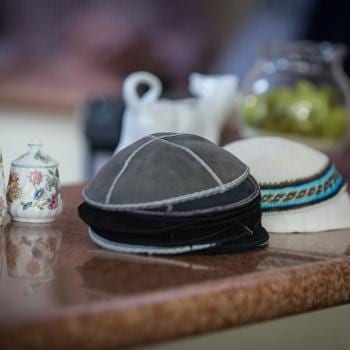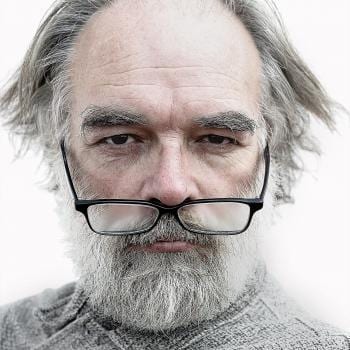The Vision, pp. 93-95
Okay. Where are we? Magdalene, the erstwhile young prostitute, has joined our merry band. There’s Omar, the Black converted ex-con; Asher, the Jewish convert whose relationship with Dan, who died in a maybe-terrorist gas explosion, is never quite explained; Cheyenne, who drives a pink panel truck and dreams of love; and Hope, whose love of herbs is in some form a product of her Native American roots and her hippie charm. We’re never really introduced to Malachi, the ostensive patriarch of this clan, which is an interesting choice.
So. It’s Monday morning, and Cheyenne is up and getting ready for work. As she bustles around preparing, she throws a bit of a monologue at Magdalene:
“During the day, the place where we had the Bible study is my mail order herb store. Bobbie Jo is my best friend, but she’s half bulldog; she works for me. You’ll get used to her. She is the bookkeeper, webmaster, and pulls the orders. The guys literally fall over their feet when she walks down the street. When we are bored, we take walks for laughs.
“Julie is my main packer, and keeps up with shipping inventory. She’s a little sweetheart and a real cutie pie. You will just love her. All three of us pack orders, ship, and clean and such. Everyone calls us The Trio because we are always together. Bobbie Jo is big and tough, but she has a tender heart; but don’t tell her I said so. Julie is small and has dusty blond hair that hangs just below her shoulders.”
This book is just weird. No one talks like this! Do you ever mention a friend’s appearance when you are describing them to someone else before they meet them? I don’t! I usually mention how I met them, what their job or professional background is, what we do when we hang out, hobbies, that kind of thing.
Why exactly is Cheyenne about to introduce Magdalene to big, outspoken Bobbie Jo and small, quiet Julie in the first place? Well. About that.
“Spare me your stupid conversation about your freak friends.” Magdalene’s nasty response surprised Cheyenne.
“Sure. I certainly don’t want to waste my breath on trying to be polite by filling you in on who you’ll be working with.” Cheyenne’s answer seemed to have no rancor, but she felt like spitting in the girl’s face.
Stunned by the raw anger and hurt the girl displayed, Cheyenne prayed for wisdom. God help us! She is so full of hate, deceit, and fear. Help us, Lord. Please cut away the ugliness from her soul, just like you cut away the ugly dyed hair, sos he can see your love. Then, glancing at her watch, she said, “Anyways, Kid, I work for a living, so we need to get moving. I have hundreds of orders to fill today, and I mean to put you to work helping me. Ready? Let’s get moving.”
Okay. I have questions.
Omar found Magdalene at the side of the road and brought her to the Bible study, where Cheyenne fed her. So far so good. This is the one and only thing Magdalene told Cheyenne about herself:
“I’m eighteen and my parents are dead. I’ve been on my own since I came of age and was kicked out of a foster home three months ago.”
That’s clearly a lie, and Cheyenne knows it. Cheyenne (and everyone else) strongly suspects that Magdalene is actually under age, which she is. She’s sixteen. But what’s baffling is that we never see anyone talking to Magdalene about any of this, or asking what she wants. After Magdalene tells Cheyenne the above, while eating in the kitchen at the Herb Den during Bible study, Cheyenne suggests that Magdalene come home with her so she can give her some new clothes, and with some trepidation, Magdalene acquiesces.
That’s it. Somehow we went from that to Cheyenne informing Magdalene that she’s working at the Herb Den. “I have hundreds of orders to fill today, and I mean to put you to work helping me,” Cheyenne says.
Remember, they’re all pretty sure that Magdalene is under age.
Look, if I invited a hungry, vulnerable girl I found alone on the side of a highway entrance ramp home for cookies and new clothes, I wouldn’t then inform her that she’s going to work for me. At the moment, I actually could use someone like this! “Okay, Kid, I’m going to put you to work supervising my children’s remote schooling, washing the dishes, and getting dinner on the table.” I may not have a family business, but this would be very helpful! And yet, I can’t even imagine thinking of actually doing that, because that would be child trafficking. A vulnerable teenage runaway needs support, services, and access to education, not room, board, and unpaid labor.
In fact, I would get in trouble if I did that to my own child at 16. Doing this to someone else’s child is also wrong. At age 16, children have a right to an education, and freedom from forced or unpaid labor. But here we are!
No one ever says a single world about Magdalene getting paid. Not one. No one ever suggests that maybe they should see about helping Magdalene get her GED. No one ever asks her what she wants to do with her life. No one ever asks if she has any relatives they should contact (an aunt? a grandparent?). This is bizarre.
They find a 16-year-old child on the side of the road, and their response is to move her into Cheyenne’s room, put her to work in the family business, and provide her only with room and board, and not even address education.
This is literally child trafficking.
Just … what.
Also, they are not social workers, or psychologists. They don’t know what Magdalene has been through, or what she needs. Cheyenne describes her as being “full of hate, deceit, and fear,” and calls on God to “cut away the ugliness from her soul.” But Cheyenne is not trained in working with … I’m casting about for the right word here … child trafficking victims doesn’t sound quite right, both because it sows confusion about Magdalene’s situation (she did not have a pimp, she chose to engage in sex work herself, out of desperation) and because Cheyenne is literally trafficking her (for labor, not for sex, but still). Still, my point stands. Cheyenne has no experience working with people with Magdalene’s background. She’s drawing on her religious values only.
This reminds me of evangelicals’ emphasis on “biblical counseling,” and the debate over whether “biblical counseling” is actually real counseling. Ordinarily, counseling and therapy is based in things like psychology, not on an ancient religious text that one believes is infallibly true and the best guidance for life.
What Cheyenne and her family are doing is wrong. Wrong, wrong, wrong.
“Don’t call me Kid. I’m as far from being a kid as your grandmother.”
With a pleasant expression still pasted on her face, Cheyenne spoke again, this time making an effort to drop her persistent use of the word anyways. “Well, it’s time to leave if we’re going to be on time. And it’s your choice what we call you. Okay, Not Kid, I’ll call you Mag or Maggie or girl because your name is too long. Which will it be?”
This is the exact opposite of “it’s your choice what we call you.”
Magdalene leaned back in her kitchen chair and twirled her breakfast spoon as if she had not heard a word spoken. At her limit, Cheyenne’s face hardened and her tone lowered. “I said let’s go. You can come to work with me or I’ll dump you off at the local police, but I am through putting up with your attitude. You got that? Your weekend’s over. Come on, Maggie.”
The young girl flinched as if she had been slapped, and she quickly responded in a strange little kid kind of way, “Okay, I’ll take girl … just don’t ever call me Maggie.”
This is profoundly disturbing—and it won’t be the first time they threaten to drop Magdalene off at the police station, in order to get her to do as they want. As I said, this is literally child trafficking.
A few weeks ago, someone noted that while this book is billed as book 1 of a series, no more were ever published. This is true, and I think I understand why. It’s because of weird inside jokes like this one:
“Do you really have a city called Trashville?”
Cheyenne chuckled as she walked out the door. “No … we just always called big cities Trashville, and our hole in the wall here we call Nowheresville, and our county we call Hicksville. I never thought about it.”
Magdalene asks this because when describing Bobbie Jo and Julie, Cheyenne and said that they used to go “ballroom dancing in Trashville” before things got so hectic with the store. But this isn’t the first time we’ve seen this term. Earlier in the book, Asher referred to Nashville as Trashville, and Knoxville as Poxville. What is the point of this? It is never explained. There does not appear to be a point. As I said, it reads like an inside joke.
I’m going to try to keep the length of these installments a bit more manageable, so I’ll leave it here.
I have a Patreon! Please support my writing!















